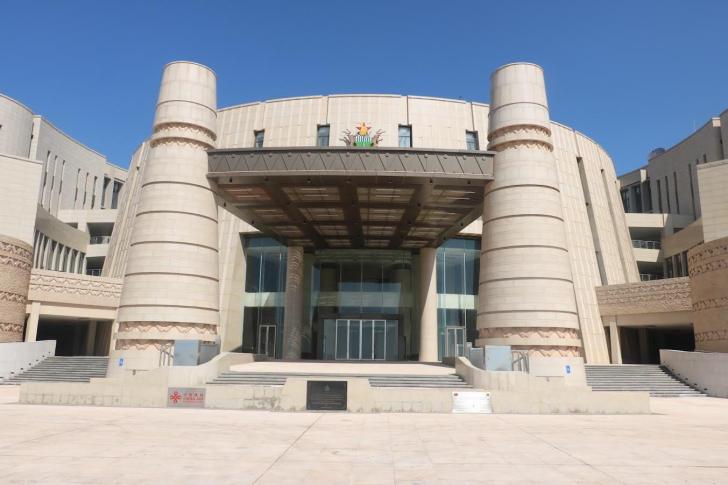News / National
Zimbabwe moves towards abolishing death penalty
13 Dec 2024 at 09:35hrs |
0 Views

In a rare display of unity, both Houses of Zimbabwe's Parliament have passed the Death Penalty Abolition Bill, marking a significant step towards ending capital punishment in the country. The Bill, which has drawn praise globally for promoting human dignity, now awaits presidential assent.
The passage of the Bill saw strong bipartisan support from both the ruling Zanu-PF and opposition Citizens Coalition for Change (CCC), reflecting a rare moment of cooperation between political rivals. President Emmerson Mnangagwa, who narrowly avoided execution during the liberation struggle, has long condemned the death penalty, further highlighting the significance of this decision.
During the Senate debate, Justice, Legal and Parliamentary Affairs Minister Ziyambi Ziyambi, who also serves as the Leader of Government Business in Parliament, praised the opposition for introducing the Bill. "I just want to thank and congratulate the Senators for this historic occasion; historic in the sense that this Bill was not originated from the Executive, but from one of our members who is not from the ruling party," Ziyambi said. "It indicates that when it comes to national issues, we come together and put our heads together to do the correct thing."
The motion for abolishing the death penalty was raised by Dzivarasekwa legislator Edwin Mushoriwa of the CCC. Mushoriwa called for an amendment to section 47 of the Criminal Law (Codification and Reform) Act and the repeal of sections 337 to 342 of the Criminal Procedure and Evidence Act, which would effectively abolish the death penalty in Zimbabwe.
Ziyambi, in his support for the Bill, argued that the death penalty has proven ineffective in deterring crime, citing studies that show no significant reduction in murder rates or terrorism in regions where capital punishment is enforced. He questioned its efficacy as a deterrent, noting that the number of murders remains constant despite its existence. "It does not deter. It is actually a question that is debatable," Ziyambi stated, referring to international studies that show no correlation between the death penalty and crime reduction.
He also highlighted the disproportionate impact of the death penalty on poor and marginalized communities, arguing that it is biased against disadvantaged individuals. "The majority of people who have been executed are those struggling or in poverty," Ziyambi said. He added that the death penalty also carries a racial bias, a reflection of historical injustices.
The Cabinet had agreed earlier this year to abolish the death penalty for murder offences, following nearly two decades without an execution. Zimbabwe has effectively been on a moratorium on executions since 2005, though the death penalty remains enshrined in the country's Constitution, with exceptions for women, men under 21, and men over 70.
With the passage of this Bill, Zimbabwe joins a growing list of countries worldwide that have abolished or imposed a moratorium on the death penalty. At least 170 nations have eliminated capital punishment in law or practice, and in southern Africa, Zimbabwe will now join Angola, Madagascar, Mauritius, Mozambique, Namibia, Seychelles, South Africa, and Zambia in abolishing the death penalty for all crimes.
Zimbabwe currently has 62 prisoners on death row, most of whom are held at Harare Central Prison. The passage of the Death Penalty Abolition Bill marks a monumental shift in the country's approach to justice and human rights.
The passage of the Bill saw strong bipartisan support from both the ruling Zanu-PF and opposition Citizens Coalition for Change (CCC), reflecting a rare moment of cooperation between political rivals. President Emmerson Mnangagwa, who narrowly avoided execution during the liberation struggle, has long condemned the death penalty, further highlighting the significance of this decision.
During the Senate debate, Justice, Legal and Parliamentary Affairs Minister Ziyambi Ziyambi, who also serves as the Leader of Government Business in Parliament, praised the opposition for introducing the Bill. "I just want to thank and congratulate the Senators for this historic occasion; historic in the sense that this Bill was not originated from the Executive, but from one of our members who is not from the ruling party," Ziyambi said. "It indicates that when it comes to national issues, we come together and put our heads together to do the correct thing."
The motion for abolishing the death penalty was raised by Dzivarasekwa legislator Edwin Mushoriwa of the CCC. Mushoriwa called for an amendment to section 47 of the Criminal Law (Codification and Reform) Act and the repeal of sections 337 to 342 of the Criminal Procedure and Evidence Act, which would effectively abolish the death penalty in Zimbabwe.
He also highlighted the disproportionate impact of the death penalty on poor and marginalized communities, arguing that it is biased against disadvantaged individuals. "The majority of people who have been executed are those struggling or in poverty," Ziyambi said. He added that the death penalty also carries a racial bias, a reflection of historical injustices.
The Cabinet had agreed earlier this year to abolish the death penalty for murder offences, following nearly two decades without an execution. Zimbabwe has effectively been on a moratorium on executions since 2005, though the death penalty remains enshrined in the country's Constitution, with exceptions for women, men under 21, and men over 70.
With the passage of this Bill, Zimbabwe joins a growing list of countries worldwide that have abolished or imposed a moratorium on the death penalty. At least 170 nations have eliminated capital punishment in law or practice, and in southern Africa, Zimbabwe will now join Angola, Madagascar, Mauritius, Mozambique, Namibia, Seychelles, South Africa, and Zambia in abolishing the death penalty for all crimes.
Zimbabwe currently has 62 prisoners on death row, most of whom are held at Harare Central Prison. The passage of the Death Penalty Abolition Bill marks a monumental shift in the country's approach to justice and human rights.
Source - newsday
Join the discussion
Loading comments…
























